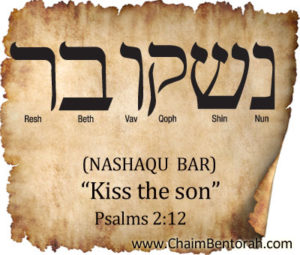HEBREW WORD STUDY – KISS THE SON – NASHAQU BAR נשׁקו בר
Psalms 2:12: “Kiss the Son, lest he be angry and ye perish from the way, when his wrath is kindled but a little. Blessed are all they that put their trust in Him.”
 Obviously, the writer is not talking about a kiss between lovers to show sexual passion. He is most likely making a reference to the Oriental custom which dictates that you kiss a king’s hand to show respect or to show honor to a person. Is this really speaking of Jesus or the Messiah as most Christians interpret this? Is it telling us to show respect for Jesus? Still, if this is to be a reference to Jesus or the Messiah the writer would have to be using a kiss in a figurative or metaphoric way as we cannot give a literal, physical kiss to Jesus. I think what we really need to do is examine this word kiss.
Obviously, the writer is not talking about a kiss between lovers to show sexual passion. He is most likely making a reference to the Oriental custom which dictates that you kiss a king’s hand to show respect or to show honor to a person. Is this really speaking of Jesus or the Messiah as most Christians interpret this? Is it telling us to show respect for Jesus? Still, if this is to be a reference to Jesus or the Messiah the writer would have to be using a kiss in a figurative or metaphoric way as we cannot give a literal, physical kiss to Jesus. I think what we really need to do is examine this word kiss.
The word kiss in Hebrew is nashaq which means a joining together. The word seems to have originated as a military term for arraying oneself for battle. It may come from an old Akkadian word used to bring men together to prepare themselves for war or battle. It is sometimes used as a reference to training for battle as the word is used for touching. The soldiers would train in hand to hand combat which involved touching each other. It could be the writer is telling us that we are to come together with the Son before doing battle and that we are to be in such close contact with the Son that we may actually touch him.
But then again the root word for kiss could also be nasa’q which means to kindle a fire or become passionate. If this were the case then the verse would be saying that we should Have passion for the Son. If the Son is indeed a reference for Jesus then this would make much more sense. The only thing that bothers me is that He would be angry if we didn’t kiss him or join ourselves together with Him or show passion for Him. That makes Jesus sound pretty insecure.
Lest examine this word son which is bar, not ben. Curious that the Masorites made the word bar and not ben. Ben means son, but bar is an Aramaic word meaning discipline. There are occasions when an Aramaic word is used in the Old Testament.
Many translators say the word bar comes from root barar which means to make pure. My personal view is that the word bar is used to express multiple layers of understanding. So let me just take you to another level of understanding. By that, I am saying the traditional meaning of son is not at all incorrect, but I am just sharing another level to consider a possible spiritual lesson by saying the root is barar or to make pure. Thus, a literal rendering would be: “Make sure your passion is pure.”
Now we can look at this next phrase. If our passions are not pure then there will be anger. Traditionally it is rendered as lest He be angry. But since we are no longer talking about a son but about purity we need to find another word other than lest. The word lest is a Pei Nun word and has a variety of meanings. The words that are most commonly applied to Pei Nun is to turn away from. If our passions are pure we will turn away from anger.
I discussed anger in earlier chapters where we learned it comes from the Hebrew word aneph which is the snorting of a camel. It does not have to be rendered as anger just a strong emotion and the context will tell you which emotion, anger, grief, desire etc. The context suggests we use a negative emotion. So I would personally render this verse as: “Make your passions are pure and turn away from strong negative emotions.” If you do this you will not perish by the way.
My final alternative reading for this verse would be: “Make sure your passions are pure, turn from strong emotions because you will lose your way. Even a little emotion such as anger will consume you.







Trust in Hebrew is batach which means to weld. In modern Hebrew it is the word for glue. To trust in God is to weld yourself to Him. I guess in that case that kiss we give to the Son will have such passion that it will just weld us to Him. Chaim.
Hi, thank you, but what about the end of this verse saying (KJV): “Blessed are all they that put their trust in him” please?
Many thanks.
Have a great day.